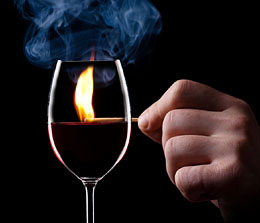 I recently made a Pinot Noir and all was great until just prior to bottling. I tasted throughout the fermenting process and was pleased with the taste, but a sulfur smell/taste developed just prior to bottling! What did I do wrong?
I recently made a Pinot Noir and all was great until just prior to bottling. I tasted throughout the fermenting process and was pleased with the taste, but a sulfur smell/taste developed just prior to bottling! What did I do wrong?
Name: Scott
State: California
—–
Hello Scott,
Sorry you are having such a problem with your wine. I know it can be upsetting when all seemed to be doing so well.
There are a several common issues that can cause your wine to have a sulfur taste and smell after it has fermented. Here are the 3 most common reasons that match up with your situation:
- Adding too much sulfite to the wine. This would either be in the form of potassium metabisulfite, sodium metabisulfite or Campden tablets. If normal sulfite dosages are used this is not likely to be the cause, but if too much sulfite is accidentally added, it could be why you are experiencing this taste and smell in your wine. You can use a Titrets and the Titrettor Hand Tool to determine how much free sulfur dioxide is in the wine, but this will not tell you how much bound sulfur dioxide is in the wine. The permanently bound sulfite can build up over the winemaking process if to many doses of sulfites are added to the wine, whereas the free sulfite can leave as a gas if given the opportunity. Here’s some more information free and bound sulfites in your wine. If you used no more than 3 or 4 sulfite doses throughout the winemaking process your wine will not be suffering from this. Most of the time, simply aging the wine will completely rid the wine of this fault, but in some extreme cases aging may not be enough. If you still experience a sulfur taste or smell upon decanting the wine, then pour the wine in a carafe and let is set for an hour or so before drinking. This will greatly help to reduce this wine fault.
- Putting the yeast under stress. If the fermentation did not completely ferment all the carbohydrates, it could be a situation where the fermentation started up again due a change in the wine’s environment. This would be something like: new oxygen exposure through racking; warmer liquid temperature —something that made the wine yeast want to come out of their dormant state and start fermenting again with less than optimal conditions. If the fermentation starts up again under stress then excessive amounts of hydrogen sulfide can be the result. There are other stressful situation the wine yeast could have been in during the original fermentation, but if that were the case, you would have noticed the sulfur taste and smell before now.
- Wine sat on the sediment to long. The sediment is made up mostly of yeast cells, both dead and dormant. If the sediment stays in the wine too long you can start to experience the effects of autolysis. This is where yeast cell start to consume other yeast cells — a cannibalization of sorts. In advanced cases of autolysis you will experience a sulfide odor and off-taste. This is somewhat related to number 2, above, in the sense that you can have a stressful reawakening of the wine yeast while it lays at the bottom as sediment. If both of these scenarios happen, you are much more likely to have a hydrogen sulfide issue.
If you feel that your wine has experienced either stress or autolysis, then the first step would be to rack the wine into another container in a splashing manner. This will give opportunity for the hydrogen sulfide to the leave the wine as a gas. You can also use a De-gassing/Mixing Paddle to help speed up the process.
If the effects still exist after racking or de-gassing the wine a couple of times, then you may want to rack the wine over some sanitized copper. The copper contact will cause the hydrogen sulfide to leave more readily.
Scott, I hope this information helps you out. Just realize that having a sulfur taste and smell in your wine is a fault from which your fermented homemade wine can recover.
Best Wishes,
Ed Kraus
———————————————————————————————————
Ed Kraus is a 3rd generation home brewer/winemaker and has been an owner of E. C. Kraus since 1999. He has been helping individuals make better wine and beer for over 25 years.
